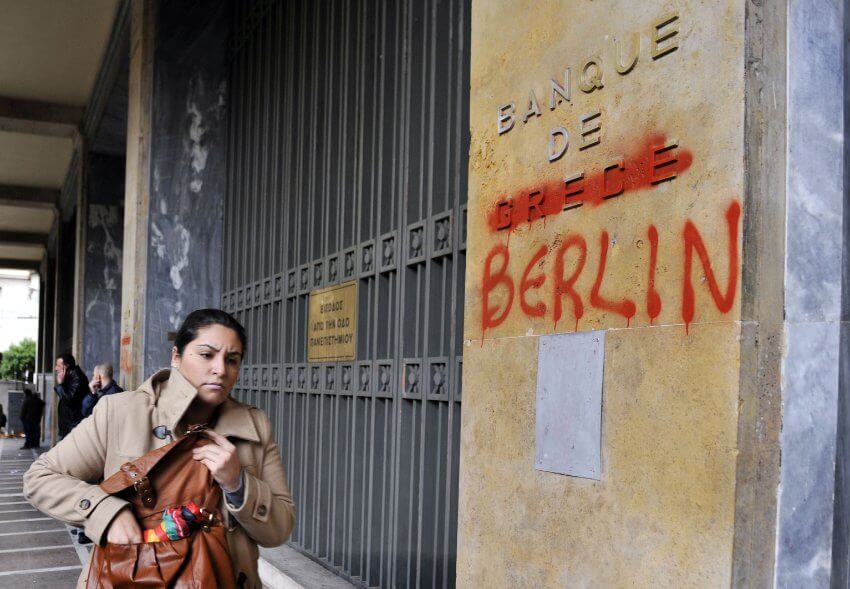The SYRIZA-ANEL made a deal with the creditors, signed in May 2, that was met with a great deal of enthusiasm from the markets. It is an agreement that will increase poverty and over-indebtedness in Greece, and will deal a blow to the country’s sovereign rights.
by Leonidas Vatikiotis & Aris Chatzistefanou
The staff level agreement which will be Eurogroup’s green light for the disbursement of the 7 billion tranche “necessary to meet debt repayments which include 2 bn. euros to private creditors due on July 17, and 3,9 bn. euros to the ECB three days later” (Financial Times, May 12), includes:
- Reduction of the tax-free limit from 8.636 euros to 5.681. A measure that will affect the poorest employees and pensioners, since even those who are paid 474 euros per month will be taxed.
- Average pension cuts of 9%, which may reach 18%, for pensions over 1000 euros. From these two measures, pensioners will lose 2 out of 12 pensions each year.
- Reduction of unemployment benefits (which today are received by merely 12% of the unemployed), poverty, child and natural disaster benefits. Those affected will be the poorest habitants of the country.
- Retail shops opening for 32 Sundays. A measure which Finance Minister P. Papadimitriou described as “modernizing” effectively equating modernization with neo-liberal deregulation of the working relations and making clear that SYRIZA has transformed completely. Against the implementation of this measure, the Trade Union and the Confederation of Small and Medium Size Businesses have already announced a strike.
- Collective dismissals are made easier by abolishing the requirement of ministerial decisions and vetoes for dismissing more than 5% of the total staff. A system of early warning by the employers will be enough.
- A reduction in the numbers of contract workers of the public sector from 49.448 on December 2016 to 49.104 at December 2017 and 48.420 at December 2019. This will result in the further dissolution of the public services.
- Privatization of 40% of the lignite units belonging to the Public Power Company and 17% of its shares. The sellout of energy will be the final blow to the public wealth by SYRIZA that broke its pre-electional promises after the sale of 14 airports to the German Fraport, of trains to the Italian Ferrovie and Piraeus port to the Chinese firm Cosco.
We should be "reasonably optimistic" about an agreement on Greece, Pierre Moscovici says https://t.co/nPLuH6e6FS pic.twitter.com/aAYxNRB39T
— Bloomberg (@business) May 12, 2017
The 7 measures above are only a small part of the total 140 measures that the Greek Parliament members have to vote by fast track procedures like it regularly happens since 2010, when the country first entered the memorandum regime. As a result the ministers don’t even have enough time to go read through the memorandum laws that are always voted during the last moment. All in the name of the state of emergency that has already been around for 7 years, as long as the Coup of the Colonels lasted from 1967 to 1974.
However there is a fundamental difference. The measures that will be voted by the Greek Parliament will be applied at 2019-2020. By then another government will be in power, since the service of the current government, which was elected in 2015, ends at 2019. Also, the 3rd economic adjustment program of 86 billion dollars that was signed in August 2015 (by a government ordered to cancel the austerity and tear up the memorandum) ends at September 2018.
Therefore, neither the creditors (EU, IMF) had the jurisdiction to demand such measures, nor the government alliance of SYRIZA and the far right ANEL had the legitimation to impose them. It is unacceptable for a government to tie the next government with its decisions.
The government attempts to prettify the situation using two arguments: The first is the acceleration of the relief of sovereign debt. The government however has already signed the exclusion of a debt write-off, limiting the possible solutions to a new grace period, debt repayment lengthening and lower interest rates. As a result, debt-wise, the IMF appears to be more radical than the Left and the Far Right government.
Greek public debt reached 176% of the GDP after the 2012 restructuring, from 115% in 2009, before the arrival of Troika.
The government’s second argument is about relief measures that will be implemented in case the surplus surpasses 3,7% of the GDP. There will be spending for school meals (just so the kids won’t faint at schools), tax reliefs and so on, from the money gathered beyond the 3,7% of the GDP as a reward.
Until then however extreme poverty that affects 13,3% of the population will reach record levels. Recession will continue to shut out any possibility of unemployment reduction from 23% which is the highest in Europe. Under these conditions, the demand for immediate cessation of payments and unilateral debt write off, returns urgently. The government which has recently been congratulated by Pierre Moscovici for imposing 200 reforms against its people, surpassing any previous government, must use the report of the Debt Truth Committee, which described the public debt as odious and illegal to denounce the loan agreements and proceed to a rupture with the creditors: ECB, EU, IMF.
In this fight the people of Europe stand on our side because they know that more than 90% of the rescue loans return to the creditors. We loan to save Deutsche Bank, BNP, Paribas, ABN AMRO and the Greek zombie banks until they were bought by the vulture fund of Paulson.
Any other compromise policy will perpetuate poverty and the abolition of sovereign rights, as it keeps on happening since 2010.











